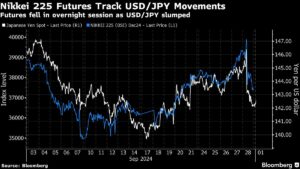China’s Property Crisis and Japan’s Leadership Race: How the Markets React
The recent move by China to address its ongoing property crisis caused a surge in equity markets in both mainland China and Hong Kong. Meanwhile, Tokyo shares suffered a setback after a proponent of tightening monetary policy at the Bank of Japan emerged victorious in the ruling party’s leadership race.
The CSI 300 index in China was on track to enter a technical bull market, fueled by a boost in iron ore and Chinese developer stocks following the relaxation of housing purchase rules in three major cities. On the other hand, the Nikkei and Topix indexes in Japan fell as investors were caught off guard by Shigeru Ishiba’s unexpected win in the LDP election.
Analysts are now analyzing the implications of China’s stimulus measures, softer US inflation data, rising geopolitical tensions, and the surprising results of the Japanese leadership race. Michael Wan of Mitsubishi UFJ Financial Group predicts that Ishiba’s victory will uphold the status quo of supporting Bank of Japan normalization, providing stability for the yen.
Looking ahead, global economic conditions are showing signs of improvement, thanks to China’s stimulus efforts and interest rate cuts by central banks worldwide. The Federal Reserve’s data on US inflation and household spending in August indicate a cooling economy, prompting expectations of further rate cuts in the coming months.
According to the latest Bloomberg Markets Live Pulse survey, US stocks are expected to outperform Treasuries for the remainder of the year, with emerging markets preferred over developed ones. However, tensions in the Middle East escalated following Israel’s killing of Hezbollah leader Hassan Nasrallah in Beirut, raising concerns about potential conflict.
Oil prices remain steady as Iran contemplates its response to Israel’s actions in the region. While Iran’s embassy in Beirut condemned the strikes as a dangerous escalation, President Masoud Pezeshkian stopped short of promising immediate retaliation against Israel.
Market watchers are closely monitoring Eurozone inflation and manufacturing data, as well as the US jobs report due later in the week. These reports will offer insights into the future course of Federal Reserve rate cuts and economic trends for the remainder of the year.
In summary, the financial landscape is evolving rapidly, influenced by a mix of domestic policy decisions, global economic trends, and geopolitical developments. Stay informed and stay ahead of the curve with Extreme Investor Network for expert analysis and insights into the world of finance.

